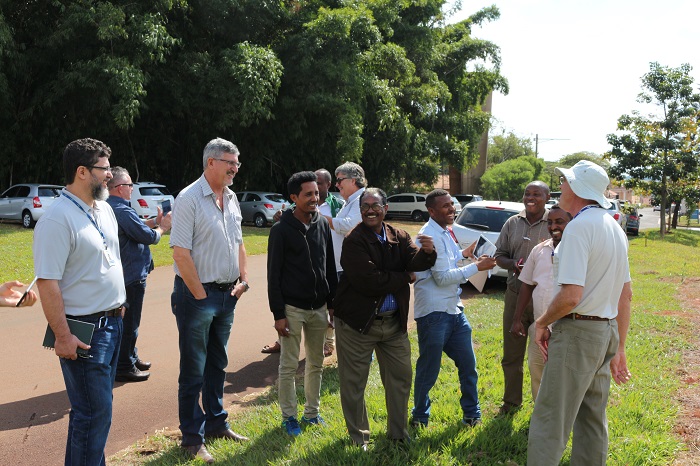Ethiopian mission learns about grasses and sustainable systems in São Carlos
Ethiopian mission learns about grasses and sustainable systems in São Carlos
Photo: Laura Pereira

Alberto Bernardi and Marcos Brandalise (the first ones from left to right) accompanied the visit at Embrapa Southeast Livestock
A group composed of farmers, an investor and the owner of an agricultural company from Ethiopia made a technical visit to Embrapa Southeast Livestock (São Carlos,SP) na terça-feira (15). They were invited to come to Brazil by the seed company Sementes Marangatu, which contacted the research center. The idea was to show different grass species and sustainable production systems.
The Ethiopians were welcomed by the researchers Alberto Bernardi and Francisco Dübbern de Souza. “They wanted to check production efficiency in Brazil. Curiously, the grass species came from Africa. Brazil performed their breeding and genetic improvement, and organized the business. They came to learn about possibilities”, Alberto stated.
At the grass showcase, Francisco showed all the cultivars available in the market. They also introduced ICLFS (Integrated Crop-Livestock-Forestry Systems), which allows the use of grasses in sustainable production systems. Within integrated systems, farmers use the same area to plant crops (generally soybeans or maize), raise livestock (beef or dairy cattle) and compose forests (generally eucalyptus). In addition to diversifying income generation at the property, integrated systems ensure there is a positive balance between greenhouse gas emissions and soil carbon sequestration.
Alberto reported that the group was accompanied by Marcos Brandalise, a Brazilian agronomer who lives in Nairobi and who has built bridges between demands from farmers and investors in Africa and technologies developed in Brazil for 30 years. “He seeks adaptable technologies”, the researcher explains.
According to Alberto, the visitors were quite pleased with the visit. “The Africa of today corresponds to Brazil in the 1960s/1970s. They have difficulties with machinery, inputs, basic technologies. Before furthering management practices, they should improve sowing”, he commented.
Translation: Mariana Medeiros
Ana Maio (Mtb 21.928)
Embrapa Southeast Livestock
Press inquiries
pecuaria-sudeste.imprensa@embrapa.br
Phone number: +55 16 3411-5734
Further information on the topic
Citizen Attention Service (SAC)
www.embrapa.br/contact-us/sac/
